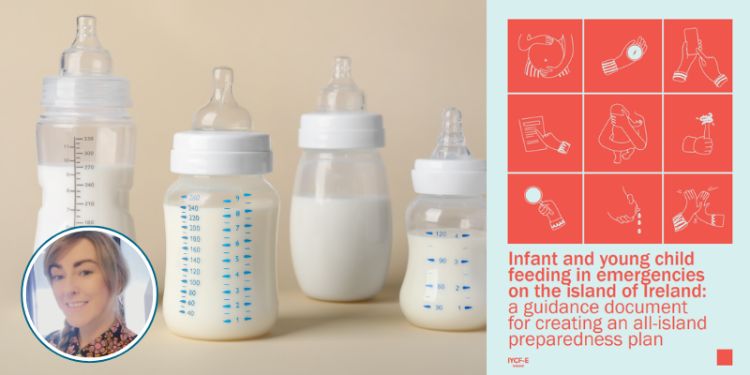‘Waiting until harm is done is not an option’: protecting children’s nutrition during emergencies

Dr Clare Patton has co-edited a report on Infant and Young Child Feeding in Emergencies.
Emergencies, such as natural disasters and public health crises, can severely impact the nutrition of infants and young children. These disruptions can lead to malnutrition, illness, and higher mortality rates among vulnerable groups due to interruptions in food supply chains, lack of access to clean water, and insufficient breastfeeding support.
Despite the increased risks faced by infants and young children in these situations, Ireland currently does not have a comprehensive plan for Infant and Young Child Feeding in Emergencies.
Dr Patton and her colleagues Dr Aileen Kennedy and Dr Liz O’Sullivan emphasize the significance of integrating infant and young child feeding into emergency preparedness plans.
They write:
In preparation for an emergency, a formalised infant and young child feeding in emergencies plan needs to be developed for the island of Ireland, and it needs to be incorporated into all emergency management documentation in both jurisdictions.
Their report was supported by funding from the North-South Research Programme, and was led by Technological University Dublin and Queen’s University Belfast (QUB).
Dr Patton was the Principal Investigator (PI) on this project while at Queen's University Belfast (QUB) and continued in a leadership role following her move to Leeds. As lead for the law and policy stream, she oversaw a comprehensive legal analysis of infant and young child feeding (IYCF) frameworks across Ireland, the UK, and the EU. Working with a small research team that included postdoctoral researcher Dr Samantha Hopkins, she conducted the first doctrinal study of its kind involving these specific jurisdictions.
The legal findings were pivotal to the report’s headline recommendations - chief among them, the urgent need for the Irish government to champion EU-level reform in two key areas: the marketing of all commercial milk formula products and the introduction of price caps on such products. Both recommendations reflect the growing evidence that legal structures at EU level are out of step with public health objectives and are contributing to affordability and equity concerns for infants across Europe.
Mapping emergencies
In parallel with the legal work, Dr Patton led on mapping the types of emergencies most likely to disrupt IYCF on the island of Ireland. Her research addressed not only large-scale crises, such as flooding and supply chain shocks, but also more localised or protracted disruptions, including domestic displacement and shelter dependency. Recognising that emergency preparedness often overlooks the distinct needs of infants and young children, she examined statutory frameworks in both the Republic of Ireland and Northern Ireland, identifying where these fall short in ensuring continuity of safe feeding in emergencies.
Drawing on humanitarian guidance, public health evidence, and legal instruments, Dr Patton proposed concrete measures to embed IYCF into existing emergency preparedness systems. These included reforms to procurement and stockpiling protocols, inter-agency coordination mechanisms, and frontline responder training – each designed to ensure that the nutritional needs of the youngest members of society are protected in times of crisis.
A unified policy vision
Working alongside her project partners, Drs O’Sullivan and Kennedy, she helped to shape a unified policy vision grounded in evidence, rights-based principles, and practical implementation tools.
She says:
If adopted, the IYCF-E Preparedness Plan would mark the first national-level framework of its kind within the EU. International stakeholders, including WHO and UNICEF, have expressed interest in Ireland’s progress, recognising the plan’s potential to inform EU (and beyond) standards and establish Ireland as a leader in this critical yet often overlooked area of emergency planning.
Moving forward, she is working with project partners to ensure that the report’s recommendations are implemented in both jurisdictions in Ireland, with a focus on translating them into practical action. In addition, she is part of a recently formed interdisciplinary group being established to explore vulnerabilities in infant and young child feeding in emergencies across England, Scotland, and Wales, building on the Irish experience to inform future UK policy and planning.
Dr Patton serves as a consultant to the World Health Organization, advising on the application of the human rights framework to infant and young child feeding. Her policy-focused publications on this topic are available here and here, and she is currently developing a report examining the human rights responsibilities of both the commercial milk formula industry and national governments.
Her work on this project has featured recently online in news sites such as Ireland Live, in print media such as the Irish Independent, and on Queen’s University Belfast Website. Click here for a previous School of Law news article relating to this project. She is a member of the Centre for Law and Social Justice and the Centre for Business Law and Practice and can be found on Bluesky @clarepatton.bsky.social and LinkedIn.




